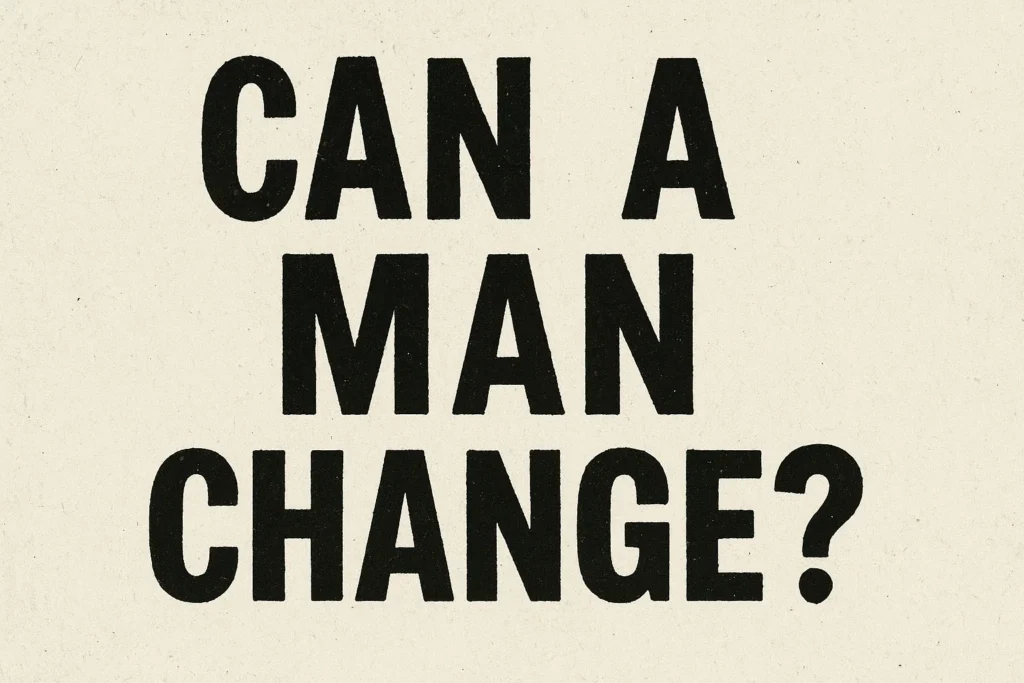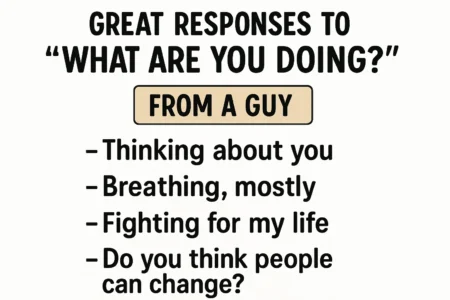It’s the question, isn’t it? The one we’ve all got stored in our phones, typed out in a text to our best friend and then deleted, just before midnight. We’ve all been there. You’re looking at this man, this person you genuinely love, but there’s this thing. This one habit, this deep-seated belief, this one, infuriating way he has of looking at the world. And a dangerous little thought pops into your head: “If he loved me… really, truly loved me… he would change this.”
That thought is a trap. And it leads every last one of us to the billion-dollar question: can a man change for a woman he loves?
I’ve lived this question. I’ve been the woman who pleaded, who tried to “manage” a partner, who hoped, and who finally got so tired she walked away. I’ve also been the woman who got to watch a man transform, not because I hammered him into a new shape, but because our love made him want to find a better version of himself.
So, what’s the real answer?
It’s yes. And it’s a hard no.
The truth is that it’s the most complicated, messy, and painfully human “maybe” you’ll ever run into. This isn’t about your love being a magic wand that “fixes” him. This is about his own will to grow, the real reason he’s doing it, and the massive, canyon-sized difference between changing a habit and changing a core part of his soul.
Let’s really get into this. Loving a man for his potential is a dangerous game, and you deserve to go in with your eyes wide open.
More in Niche, Social, and Spiritual Category
Friends Don’t Like My Boyfriend
Key Takeaways
- Look, a man can change, but the real, lasting kind has to come from inside him. You can’t force it.
- There’s a world of difference between him changing for you (which is temporary) and changing because of you (which is inspiration).
- It’s one thing to change a surface-level habit, like leaving socks around. It’s another to change a core part of his personality or his beliefs. Don’t confuse the two.
- Your love can be a powerful reason for him to change, but it can’t be the work. He has to do the work himself, for himself.
- Giving him an ultimatum or laying on the pressure might get you what you want for a week. But you’ll get resentment for a lifetime.
- In the end, you can’t make anyone do anything. You can only decide what your boundaries are and what you’re willing to live with.
So, We’re All Asking It: Can a Man Really Change?
Let’s just start here: Yes, human beings are built for change. We’re not statues. We learn, we adapt, we make mistakes, we grow, and (if we’re lucky) we get wiser. The man he is today isn’t the guy he was ten years ago, and he won’t be the same man ten years from now. Our brains are literally wired for it.
But. And it’s the biggest “but” in the world.
It’s not simple.
We’re all a little bit in love with the fantasy, the movie-plot version, where our unconditional love is the magic healing balm that fixes his wounds and sands down his rough edges. The reality is… not so romantic. Real change is a grinding, slow, and often miserable process.
I remember dating a guy in my early twenties, let’s call him “Mark.” Mark was a riot—brilliant, hilarious, and just allergic to the concept of responsibility. Jobs were optional, paying bills was a “maybe,” and he lived in this state of pure, charming chaos. I was absolutely convinced that my love, my boring-adult stability, and my Type-A planning would just… rub off on him.
It didn’t.
My love didn’t make him responsible. It just made me his new manager. He didn’t change at all; he just got better at letting me clean up his messes. That was the first time I learned it, really learned it: there is a world of difference between changing a habit and changing who a person is.
What Does “Change” Even Mean in a Relationship?
This is our first mistake. We use this single, heavy word—”change”—to cover a dozen different, completely separate things. Before you can even ask if he’ll do it, you have to know what you’re really asking for.
Think about it. Are you asking him to…
- Change a Habit? This is behavioral. “Could you please try to put your socks inside the hamper?” “Can we make a rule to put our phones away at dinner?” “It really stresses me out when you’re late, can you work on that?” This stuff is about day-to-day compromise. It’s the most “doable” kind of change.
- Change a Skill? This is about learning something new. “I’d love it if we could get better at talking about our feelings, even when we’re mad.” “Can we take a class and learn how to budget our money?” This takes real effort and a willingness to feel dumb for a while, but it’s 100% possible.
- Change a Core Trait or Value? This is the red-alert danger zone. “I wish you were just more ambitious.” “I need you to be a more positive person.” “I know you’ve always said you don’t want kids, but I want you to want them.”
You feel the difference, right? We hope for a core change, but we try to frame it as a simple habit. A man can learn to put the toilet seat down. It is a monumental, life-altering event for him to learn how to be an optimist if he was born a pessimist.
What Actually Makes a Man Want to Change?
Here’s the secret, the one that took me most of my twenties to figure out: A man will almost never make a lasting change just because you asked him to.
He might comply with the request. He might do it for a week, or even a month, just to make the fighting stop.
But that’s not change. It’s a ceasefire.
Real, permanent change is an inside job. It’s not optional; it’s the only way. The “why” has to come from him. He has to see the problem for himself. He has to be the one who’s unhappy with the way things are.
So what lights that fire?
Often, it’s a “rock bottom” moment. This doesn’t have to be a big, dramatic movie scene. It could be a health scare that makes him re-evaluate everything. It could be watching a friend’s marriage implode and realizing he’s making the exact same mistakes. Or, yes, it could be the very real, very terrifying, and internalized threat of losing you.
But even then, the threat itself isn’t the motivator. The motivator is his own realization of what that loss means to him. He has to see that the change benefits him—by making him healthier, or happier, or a better father, or the man he wants to see in the mirror. It can’t just be about you.
Is He Changing For Me, or Because of Me?
This distinction is everything. It’s the single biggest predictor of whether you’ll have a relationship that thrives or one that dies of resentment.
Changing For You is a performance. It’s driven by external pressure. It’s the “Ugh, fine, I’ll go to therapy if you’ll just stop talking about it” kind of change. This change is brittle. The second you stop watching, the second the pressure is off, he’ll revert. And worse, he will grow to resent you for it. You’ve become his warden. He’s the prisoner. It’s a toxic, ugly dynamic.
Changing Because of You is a revelation. It’s driven by internal inspiration. He sees something in you, or in the life you’re building, that makes him want to be better. Your presence, your values, your own growth, or the future he sees with you acts as a catalyst. The desire is 100% his, but you’re the one who showed him it was possible.
My husband, for example, started going to therapy a few years into our relationship. I never asked him to. But he saw the way I worked on my own anxiety and the tools I used. He said, “I want that same peace for myself. I want to be a better partner for you and a better father for our future kids.”
That’s a “because of you” change. That’s built to last.
If It’s Possible, Why Does It Feel So Impossibly Hard?
If you’re frustrated, you have every right to be. Change is genuinely, biologically, and psychologically a nightmare for all of us.
Our brains are lazy. They love efficiency. They build super-highways for our habits, thoughts, and gut reactions. That “flaw” you hate? That’s not just a bad choice he keeps making. It’s a deeply grooved neural pathway, paved with years of repetition. Asking him to change isn’t just asking him to do something different. It’s asking him to build a whole new road, by hand, with a shovel, while his brain keeps trying to send all the traffic down the old, familiar highway.
And then there’s his identity. Those “flaws” might be tangled up in who he thinks he is. The “irresponsible” guy might see himself as “fun-loving and spontaneous.” The “stubborn” man might see himself as “principled and steadfast.” When you attack his flaw, he feels like you’re attacking him.
According to Self-Determination Theory, a major framework in psychology, for any person to make a real change, they must feel three things:
- Competence: They have to believe they’re capable of making the change.
- Autonomy: They must feel they are in control of their own choices. They’re doing it because they want to.
- Relatedness: They must feel connected to and supported by others.
When you try to force a man to change, you strip him of his autonomy. And, as research from psychologists at the University of Rochester has shown for decades, without that sense of autonomous choice, the motivation simply dies.
What Kinds of Changes are “Doable” (and Which Are Red Flags)?
Okay, let’s get practical. You need a way to sort this out. What you’re asking for probably falls into one of three buckets. Be honest with yourself about which one it is.
Green-Light Changes (Doable with Effort and Goodwill)
These are about behavior and logistics. He’s not changing who he is, but how he acts as your partner.
- Improving communication skills: Learning to use “I” statements, actually listening instead of just waiting to talk.
- Being more present: Agreeing that dinner is a “no phones” zone.
- Sharing the load: Taking on specific household chores or, even better, some of the mental load (like planning meals or scheduling appointments).
- Lifestyle habits: Deciding together to eat healthier, get more exercise, or quit smoking. The key word is together.
Yellow-Light Changes (Difficult, Often Require Professional Help)
These are deeper. They can be changed, but it’s a long, hard road. You cannot, and should not, walk it for him.
- Managing anger or emotional volatility.
- Overcoming any kind of addiction (gambling, drinking, porn, etc.).
- Dealing with deep-seated trauma that’s poisoning his behavior.
- Addressing untreated mental health issues like depression or anxiety.
Your love and support are vital here, but you are not his therapist. Real change here requires his commitment and the help of a professional.
Red-Flag Changes (Don’t Bank on These. Seriously.)
This isn’t a flaw; this is a fundamental incompatibility. Trying to change these is like trying to change his eye color.
- His fundamental values: His religious beliefs (or lack of them), his political identity, his core ethics.
- His core personality: You cannot make an introvert an extrovert. You can’t make a homebody an adventurer.
- His life goals: Especially the big ones. If you want three kids and he’s always said he wants none, do not, under any circumstances, believe you can “love” him into changing his mind.
- A core lack of ambition or drive.
My “Big Mistake”: Trying to Be the Change Agent
I have to tell you about “Mark” again, because I made every mistake in the book. I didn’t just hope for change. I decided to project-manage it.
It was exhausting.
And it was humiliating for both of us. I turned into a person I didn’t even like: a nag, a micromanager, a “helpful” critic. I’d leave articles open on his computer. I’d “remind” him of his to-do list. I’d correct him in mid-sentence.
He didn’t change. He just got better at hiding things. He got better at telling me what I wanted to hear. Our relationship, which had started with so much laughter and passion, turned into this tense, awful parent-child dynamic. He resented me for not accepting him, and I resented him for not becoming the man I knew he could be.
Here’s the problem: You can’t be his partner and his project manager. You have to pick one. I was trying to “fix” him because I was in love with his potential.
I learned the hardest lesson of all: You must, must, must love the man who is standing in front of you today. Not the man he could be in five years if he just listened to you.
So, If I Can’t Make Him Change, What Can I Do?
This is the part where you take your power back. It feels helpless to be told you can’t make him change. But it’s the most empowering realization in the world, because it frees you to focus on the one person you can control:
You.
Your actions from here on out should be about clarity, not control.
- Communicate Your Needs (Not His Flaws). This is a game-changer. Stop saying “You are so messy” or “You never listen.” Start using “I” statements. “I feel anxious and unsupported when I come home to a chaotic house.” “I feel disconnected from you when I’m talking and you’re looking at your phone.” This isn’t an attack. It’s an invitation. It’s giving him the “why” in a way he can actually hear.
- Set and Enforce Your Boundaries. A boundary is not a threat or an ultimatum. A boundary is a clear, calm statement of what you will and will not accept in your life. “You need to stop staying out all night” is an ultimatum. “I feel lonely and disrespected when you’re not home, and I’m not willing to be in a relationship that feels that way” is a boundary. The difference is subtle but profound. One is about controlling him. The other is about protecting you.
- Model the Change You Want to See. Do you want him to be a better communicator? Be a phenomenal communicator yourself. Want him to be more positive? Be the source of light in the room. This isn’t about being fake. It’s about being the change. Often, our partners mirror our energy.
- Acknowledge and Appreciate Real Effort. If he does start to try, notice it. Acknowledge it. Not in a patronizing “Good job!” way, but in a genuine “I really noticed you made an effort to listen to me today, and it made me feel so loved” way. Positive reinforcement works wonders.
Is It “Love” If You Need Him to Change?
This is a tough, soul-searching question. We need to sit with it for a minute.
We’re all fed this idea of “unconditional love.” But in a grown-up partnership, love is not a blind, “anything-goes” contract. Loving someone doesn’t mean you have to love every single thing they do.
It is not a failure of love to need your partner to stop doing something that hurts you. It is not a failure of love to want to grow together.
The line is here: Are you asking for a change that benefits the partnership, or are you asking for a change that benefits your fantasy?
Asking him to stop a gambling habit that’s bankrupting you is about the health of the partnership. Asking him to be tidier so you don’t feel like his maid is about the health of the partnership.
Asking him to change his laugh, his hobbies, or his friends because you find them embarrassing? That’s about your fantasy. That’s not love. That’s casting for a role.
If you find that his core being, his fundamental values, and his personality are all “flaws” to you… he may not be the one who needs to change. You may just be with the wrong man.
What If He Says He’ll Change, But Never Does?
Ah, the “broken record” syndrome. The cycle of fight, promise, temporary truce, and then… right back to where you started.
This is, in my opinion, more painful than a flat-out “no.”
When a man’s words and actions don’t line up, you must always believe his actions. Always.
Words are cheap. He’s saying what he needs to say to stop the fight, end the conversation, and relieve the pressure. He’s not saying it because he’s had an internal revelation. He’s just learned that the word “change” is the “off” button for the argument.
This is where your boundaries become non-negotiable. You’ve stated your needs. He has acknowledged them. And he has shown you, with his actions, that he is either unwilling or unable to meet them.
Now you have a decision to make. You can no longer live in the “hope” phase. You have to live in the “reality” phase. The reality is, this is who he is. Can you live with it?
Let’s Talk About a Change That Worked
I don’t want to leave you with all doom and gloom. Change is possible. I’ve seen it.
I’m a words person. My love language is all about verbal affirmation, deep talks, and “I love you” texts. My husband… not so much. He’s an “acts of service” guy. His love language is fixing my car before I know it’s broken, making me coffee every single morning, and quietly handling the finances so I never have to worry.
Early on, it was a disaster. I felt unloved because he wasn’t a poet. He felt unappreciated because his actions were going completely unnoticed.
I “needed him to change” and be more verbal. He “needed me to change” and be less needy.
The change that worked wasn’t him becoming Shakespeare. And it wasn’t me becoming a silent stoic. The change was both of us, inspired by our love and a real desire to make the other person feel loved, learning a new language.
He learned to use his words. It wasn’t natural at first, but he now makes a conscious effort to tell me he appreciates me, or that I look beautiful. And I learned to see his actions as his “I love yous.” Now, when he hands me a cup of coffee, I hear “I adore you.”
We both changed. We both grew. Not because one of us was “wrong,” but because we both wanted to “get it right” for each other.
The Uncomfortable Truth: When Is It Time to Stop Waiting for Change?
This is the hardest part. This is the moment when “hope” becomes a prison.
It’s time to stop waiting when…
- The exact same issue has been the center of your fights for years, with zero sustainable progress.
- The “change” you need is related to a non-negotiable: respect, fidelity, honesty, or physical/emotional safety.
- You realize you are more in love with the idea of who he could be than the man he is.
- The effort of managing, monitoring, and waiting for this change is costing you your own peace, your own happiness, and your own self-esteem.
Walking away doesn’t mean you failed. It doesn’t mean you “gave up” on him.
It means you finally decided to “show up” for yourself.
The Final Answer to “Can a Man Change?”
So, we’re back where we started. Can a man change for a woman he loves?
Yes.
He absolutely can. People can and do grow, evolve, and become better versions of themselves every single day.
But here is the final, unvarnished truth: He will not change because you need him to. He will not change because you are right. He will not change because you’ve delivered a perfect, logical, and passionate argument.
He will only change if he decides to, for his own reasons, on his own timeline.
Your love can be the catalyst. It can be the safe space. It can be the inspiration. It can be the beautiful reason he finally decides the work is worth doing.
But your love cannot be the engine. It cannot be the chisel.
The real question, the one you have to answer, isn’t “Can a man change?” The real questions are, “Does he want to?” and, “Can I truly, madly, and deeply love the man he is today?”
Your job isn’t to fix him. Your job is to love yourself enough to know the difference between supporting his growth and sacrificing your own happiness for his potential.
FAQ – Can a Man Change for a Woman
Can a man truly change for a woman he loves?
Yes, a man can change, but the change must come from within him and be motivated by his own desire to grow, not by external pressure or obligation.
What is the difference between changing for someone and changing because of someone?
Changing for someone is driven by external pressure and often temporary, while changing because of someone is inspired by internal realization and has a higher chance of lasting.
What kinds of changes are realistic to expect in a relationship?
Behavioral and logistical changes like improving communication, being more present, or sharing responsibilities are doable, but core personality or value changes are unlikely.
Why is it so difficult for a man to change?
Changing involves rewiring neural pathways and altering core aspects of identity, which is a slow, difficult process requiring motivation from within.
What should I do if my partner promises to change but never does?
Trust actions over words, set clear boundaries, and consider whether you can live with his current behavior, recognizing when it’s time to stop waiting for change.




